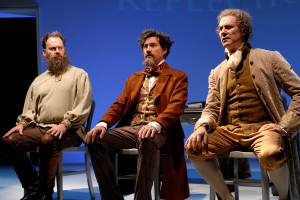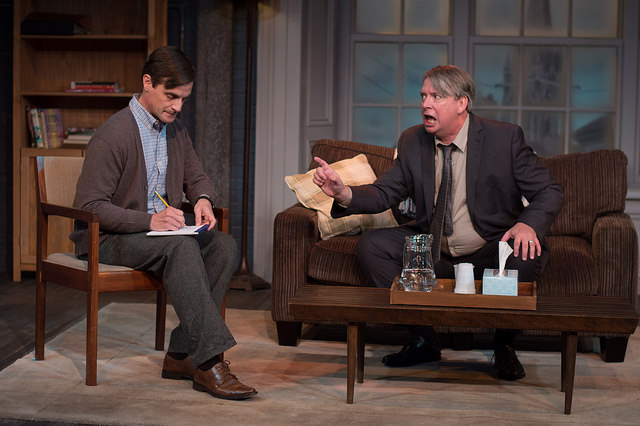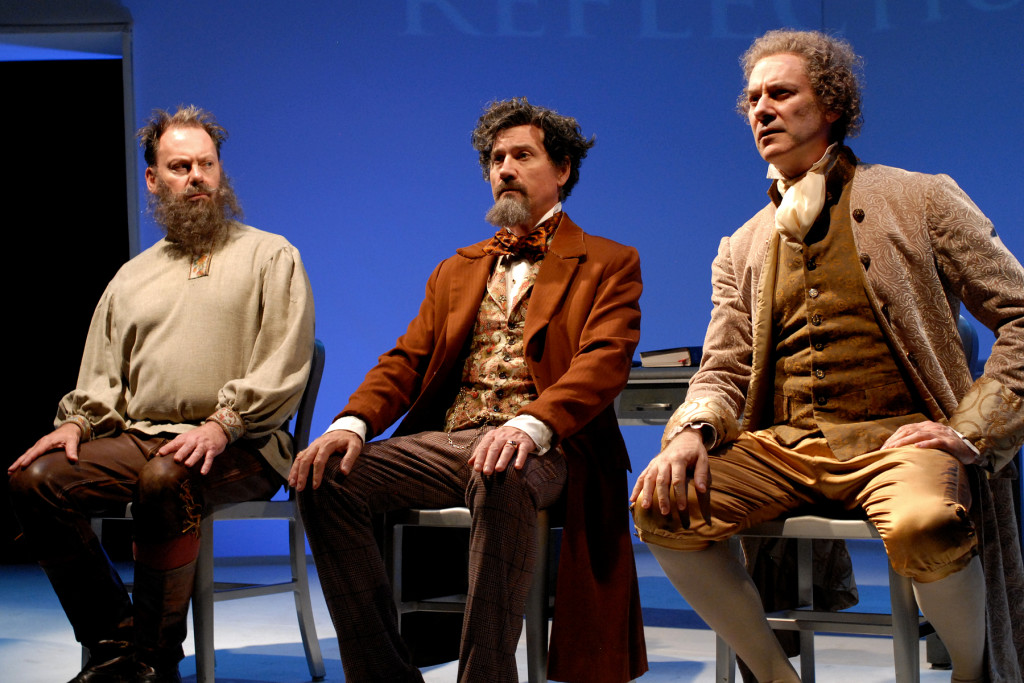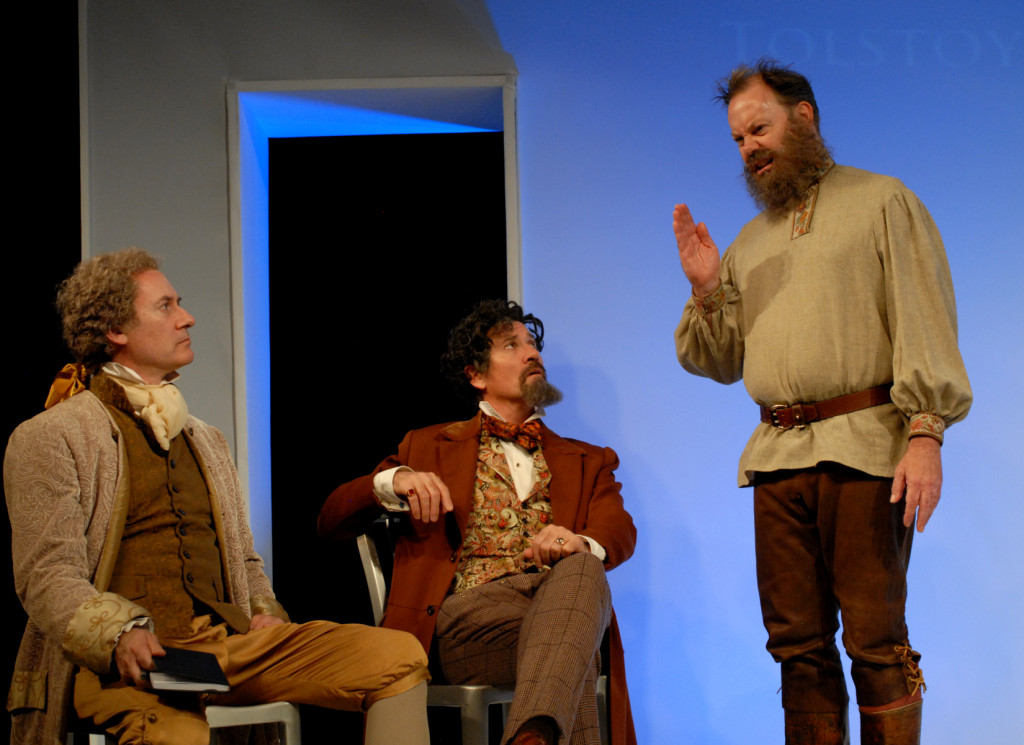Ghosts are stalking Western Mass. stages this week. Five productions I’ve seen recently are haunted – figuratively or, in a couple of cases, literally – by spectral presences that inform and impel the action. Two of them are reviewed below. The others, now playing at Silverthorne Theatre Company, Berkshire Theatre Group and Shakespeare & Company, will be covered in part 2 later this week.
Shining City, through July 12th at Barrington Stage Company, is an actual ghost story. In Conor McPherson’s play, set in his native Dublin, a distraught man tells his therapist that he’s seen his dead wife in their house. The therapist, in turn, has his own upheavals. We next see him abandoning his girlfriend, Neasa, and their baby – a union he embarked on after abandoning a previous career path to the priesthood – then edging into a new sexual liaison.
 Three of the brief play’s five scenes are encounters between the therapist, Ian, and his patient, John, and the other two are vignettes from Ian’s private life. In all of them, he is surprisingly (and for me, frustratingly) passive, seeing as he is the central character and common denominator. The play’s action and outcome happen to the protagonist, not because of him.
Three of the brief play’s five scenes are encounters between the therapist, Ian, and his patient, John, and the other two are vignettes from Ian’s private life. In all of them, he is surprisingly (and for me, frustratingly) passive, seeing as he is the central character and common denominator. The play’s action and outcome happen to the protagonist, not because of him.
Ian, as a colleague of mine has put it, is an empath. He doesn’t just listen and nod as John disgorges his litany of martial dissatisfactions, leading to fantasy-fueled sexual attempts and humiliations. He absorbs it and, in a sense, lives it – a kind of reverse transference. This, then, is a ghost story wrapped in a metaphor. There are layers on layers of interconnections, which add up to a shocking final image, but I found teasing them out more of an academic exercise than a dramatic journey.
The pace of the production, directed by Christopher Innvar in a departure from his familar presence onstage at BSC, is a bit lax for a piece in which subtle tension needs to steadily build. But the four performances are solid and believable. Mark H. Dold is Ian – a reversal of position from his previous therapist’s-office play here, when he played the visitor’s role in the premiere production of Freud’s Last Session. He gives the tightly buttoned Ian as much blood and muscle as his necessarily colorless character can handle, and the attentive focus he achieves while saying practically nothing is admirable in itself.
 The fireworks are provided by Deanna Gibson, furiously dogged as the discarded Neasa; by Patrick Ball as a chillingly alienated hustler; and especially by Wilbur Edwin Gibson as compulsively garrulous John. His Belfast drawl is, like all the cast’s Irish accents, almost accurate, and his titanic monologue at the center of the play is a tour de force of sustained longing, as desperate and eager for human connection as Ian is determined to avoid it.
The fireworks are provided by Deanna Gibson, furiously dogged as the discarded Neasa; by Patrick Ball as a chillingly alienated hustler; and especially by Wilbur Edwin Gibson as compulsively garrulous John. His Belfast drawl is, like all the cast’s Irish accents, almost accurate, and his titanic monologue at the center of the play is a tour de force of sustained longing, as desperate and eager for human connection as Ian is determined to avoid it.
Chester Theatre Company’s season opener, playing through this weekend, finds three spirits locked in a featureless room somewhere in eternity. Provided with nothing but three chairs and a desk containing a Bible and a notepad, plus a large mirror in which they see their younger selves – and though which we can observe them like witnesses peering into an interrogation booth – they attempt to fathom not only their current predicament but big, vital questions of Faith, Purpose and Vocabulary.
In Scott Carter’s (deep breath) The Gospel According to Thomas Jefferson, Charles Dickens and Count Leo Tolstoy: Discord, the titular trio search for commonalities to explain why they’re here, and come up with three: They’re all dead, they’re all here, and in life each of them created a version of the Gospel according to his own view of Jesus’ life and its meaning. Their attempts to merge the three interpretations into one leads to the play’s one-word subtitle.
 Jefferson, played by Ezra Barnes with punctilious formality, is a dapper patrician in a ribboned ponytail and embroidered frock coat. He’s a thoroughgoing rationalist, believing in Jesus’ divinity but not the miracles. The gospel he created in 1804 was a literal cut-and-paste job, a scrapbook containing only the biblical verses he approved of.
Jefferson, played by Ezra Barnes with punctilious formality, is a dapper patrician in a ribboned ponytail and embroidered frock coat. He’s a thoroughgoing rationalist, believing in Jesus’ divinity but not the miracles. The gospel he created in 1804 was a literal cut-and-paste job, a scrapbook containing only the biblical verses he approved of.
Rik Walter’s Dickens, with a shaving-brush goatee, a paisley waistcoat and a disarmingly brazen self-regard, begs to differ. He’s an orthodox Anglican whose gospel, written for his children in the 1840s, Tiny Tim would have enjoyed. He believes unhesitatingly in the loaves and fishes, the walking on water, et al., as you’d expect from the author of many miracles in his own works.
Michael Sean McGuinness, in peasant blouse and bramble beard, is Tolstoy, impassioned and splenetic, in contrast to Dickens’ complacent vanity and Jefferson’s suave reticence. His 1883 “Gospel in Brief” departed just as radically from the others’ versions, not just a condensed retelling but a revisionist tract that contradicted and repudiated the Church’s postbiblical graftings onto the narrative. He is himself a walking contradiction, though – a titled aristocrat who, in life, renounced the trappings of privilege for the simple life, but kept his estate. But as we discover, so in their own ways were Jefferson the slaveholder and Dickens the wife-abuser.
Once the Bible study begins, that discord comes at once. The very first sentence of Genesis trips them up: In the beginning was… “the word.” Really? Dickens buys that – it’s the authentic King James and besides, words are his business. But Tolstoy insists on the accurate translation from the Greek, “spirit,” and Jefferson claims “reason” as God’s motivating principle. Those distinctions define the parry and thrust of the trio’s lively discourse
Scott Carter’s day job is political satirist. He’s writer/producer for Bill Maher’s TV shows, and his script blends a parodist’s spitball in the eye of the revered icon with a comedy writer’s ear for the one-two punchline. Byam Stevens, beginning his final season as Chester’s artistic director, moves his delightfully mismatched cast efficiently (if a bit too deliberately at first) through the play’s 100-minute journey from pride (and sundry other deadly sins) to, yes folks, redemption.
Stay tuned for part 2 — Ghost Stories: The Henries, coming soon.
Gospel … Discord photos by Rick Teller; Shining City photos courtesy BSC.
If you’d like to be notified of future posts, email StageStruck@crocker.com








